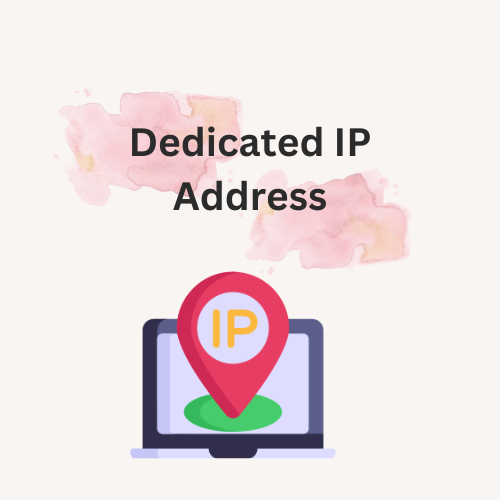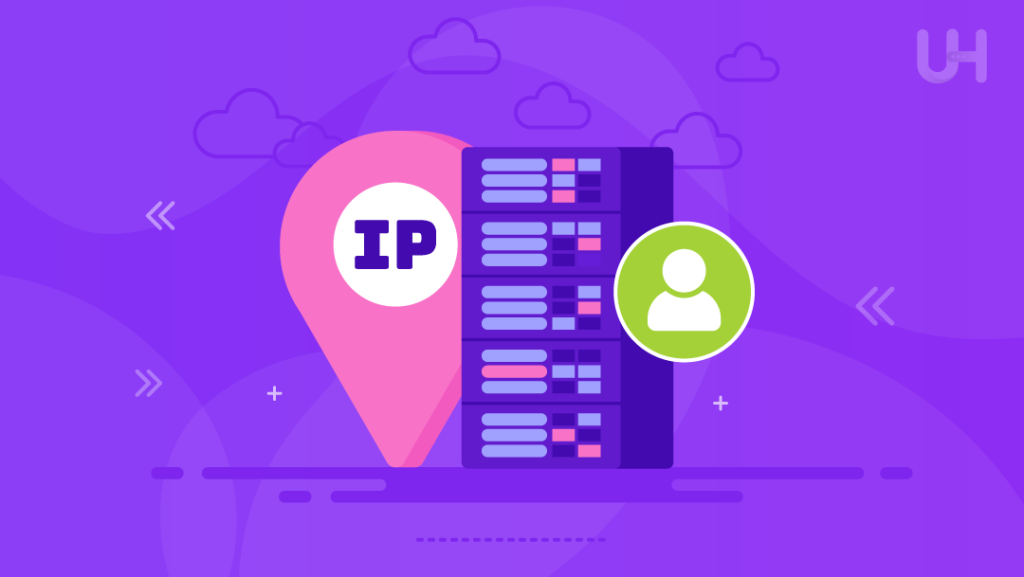
Table of Contents
Introduction
In the world of web hosting and online services, the choice between a dedicated IP address and a shared IP address is an important consideration that can significantly impact the performance, security, and reputation of a website. A dedicated IP address is a unique Internet Protocol address assigned exclusively to a single hosting account or server, offering a range of advantages particularly suited for businesses and websites with specific needs. This article explores the features, uses, benefits, and potential drawbacks of using a dedicated IP address, helping you make an informed decision about whether this option is right for your online presence.
What is dedicated IP address?
A dedicated IP address is an IP address assigned exclusively to a single hosting account or server. This is in contrast to shared IP addresses, where multiple hosting accounts or websites share a single IP address. Here are some key points about dedicated IP addresses:

- Unique Assignment: A dedicated IP address is assigned to one specific user or website, ensuring that no other entities share it.
- Enhanced Security: Dedicated IPs can offer improved security features, making them suitable for websites handling sensitive transactions, such as e-commerce sites, which require SSL certificates.
- Direct Access: With a dedicated IP, you can access your website directly through the IP address, which can be useful for certain types of server access and testing.
- Email Deliverability: Having a dedicated IP for sending emails can improve deliverability rates, as it helps avoid issues associated with other users’ email practices that might occur with a shared IP.
- Server Performance: Websites on a dedicated IP can sometimes experience better performance because they are not sharing server resources with other sites.
- SSL Certificates: Although modern SSL/TLS protocols like SNI (Server Name Indication) allow multiple SSL certificates on a shared IP, a dedicated IP can still be required for certain SSL certificates or older servers.
Overall, a dedicated IP address provides greater control and flexibility, which can be crucial for businesses and websites with specific security, performance, or accessibility needs.
Features of Dedicated IP address
A dedicated IP address offers several features that can be beneficial for various types of websites and online services. Here are some of the key features:

- Exclusive Use:
- A dedicated IP is used solely by one hosting account or server, not shared with others. This exclusivity can help in managing and optimizing server resources effectively.
- Improved Security:
- Enhanced security features are available since the IP is not shared. This is particularly important for websites handling sensitive data, such as e-commerce sites and online banking.
- Direct Server Access:
- Websites and services can be accessed directly via the dedicated IP address, which can be useful for remote management, FTP access, or setting up specific server configurations.
- Better Email Deliverability:
- With a dedicated IP, email deliverability can be improved. This is because the sender’s reputation is not affected by other users, which can be a problem with shared IPs where one user’s poor email practices can lead to blacklisting.
- Compatibility with SSL Certificates:
- A dedicated IP can be required for certain types of SSL certificates, especially older ones. Although SNI (Server Name Indication) allows multiple SSL certificates on a shared IP, some situations and configurations still benefit from having a dedicated IP.
- Stable Server Performance:
- Server performance can be more stable and reliable, as the resources are dedicated to your website or application, and not affected by traffic spikes or issues caused by other users on the same server.
- SEO Benefits:
- While SEO benefits are debated, some believe that a dedicated IP can positively impact search engine rankings by providing a unique identifier for the website.
- Custom Applications and Configurations:
- A dedicated IP is essential for certain custom applications, services, or configurations that require a static, unique IP address.
- Geolocation Specifics:
- For businesses targeting specific geographic regions, a dedicated IP address can ensure that the website is recognized as originating from a specific location, which can be beneficial for regional SEO and user experience.
- Reduced Risk of Blacklisting:
- A dedicated IP reduces the risk of blacklisting due to the actions of others. If you share an IP with spammy or malicious websites, your site’s reputation can be affected, whereas a dedicated IP isolates you from these risks.
Overall, a dedicated IP address provides enhanced control, security, and performance, making it a valuable asset for many online services and businesses.
Uses & Benefits of Dedicated IP address
A dedicated IP address offers various uses and benefits that can be crucial for certain types of online services and businesses. Here are some of the primary uses and associated benefits:

Uses of a Dedicated IP Address
- Website Hosting:
- Provides a unique address for a website, ensuring exclusive use of server resources and allowing direct access to the site via the IP address.
- Email Services:
- Ensures that emails sent from a domain are less likely to be marked as spam, as the IP reputation is solely under the control of the owner.
- Secure Transactions:
- Important for e-commerce sites and online banking, where secure and encrypted connections (SSL/TLS) are required.
- Remote Server Access:
- Facilitates direct remote access to the server for management, troubleshooting, and FTP connections.
- Custom Applications:
- Necessary for specific applications or services that require a static and unique IP address.
- Geolocation and Regional Targeting:
- Ensures the website is recognized as originating from a specific geographic location, beneficial for regional SEO and user targeting.
- DNS Stability:
- Provides stability and control over DNS settings and configurations, ensuring consistent and reliable access to the site.
Benefits of a Dedicated IP Address
- Enhanced Security:
- Provides a more secure environment, as the IP address is not shared with potentially malicious users. This is particularly important for sites handling sensitive data.
- Improved Email Deliverability:
- Ensures that the reputation of the IP address is solely dependent on the actions of the owner, reducing the risk of emails being marked as spam.
- Better Performance and Stability:
- Offers more consistent performance as server resources are not shared with other websites, reducing the impact of traffic spikes from other sites.
- Direct Server Access:
- Allows for direct access to the server using the IP address, which can be useful for administrative tasks and custom configurations.
- SSL Certificate Requirements:
- Some SSL certificates, particularly older ones, require a dedicated IP address. This can ensure encrypted connections are properly established.
- Reduced Risk of Blacklisting:
- Isolates the website from the actions of others, reducing the risk of being blacklisted due to activities from other sites sharing the same IP.
- SEO Advantages:
- Although debated, having a dedicated IP may provide a slight edge in SEO, as it offers a unique identifier for the website.
- Custom Configurations:
- Enables custom configurations and services that require a static IP address, such as certain types of VPNs, mail servers, or application servers.
- Reputation Management:
- Allows better control over the website’s online reputation, as the IP address is not influenced by the activities of other sites.
- Improved User Experience:
- Provides a faster and more reliable user experience due to dedicated server resources and a stable connection.
- Overall, a dedicated IP address provides greater control, security, and flexibility, making it an attractive option for businesses and websites with specific needs and higher security requirements.
Advantages and Disadvantages of Dedicated IP address

Advantages of a Dedicated IP Address
- Enhanced Security:
- A dedicated IP address reduces the risk of security issues associated with sharing an IP with potentially malicious websites. This is particularly beneficial for e-commerce sites and online services handling sensitive data.
- Improved Email Deliverability:
- Using a dedicated IP for sending emails helps maintain a good sender reputation, as the IP is not affected by the email practices of other users. This can result in fewer emails being marked as spam.
- Direct Access to the Server:
- A dedicated IP allows direct access to the server via the IP address, facilitating easier management, troubleshooting, and remote access.
- Compatibility with SSL Certificates:
- Some types of SSL certificates require a dedicated IP address. Even though modern protocols like SNI (Server Name Indication) support multiple SSL certificates on a shared IP, having a dedicated IP can still be necessary for certain configurations.
- Stable Server Performance:
- Websites on a dedicated IP can experience more stable and reliable performance, as they are not affected by the traffic and resource usage of other sites sharing the same IP.
- Reduced Risk of Blacklisting:
- The risk of being blacklisted due to the actions of other websites sharing the same IP is eliminated. This isolation helps maintain a clean online reputation.
- SEO Benefits:
- Although debated, some believe that a dedicated IP can provide SEO advantages by ensuring the website has a unique identifier, which might positively impact search engine rankings.
- Custom Applications and Configurations:
- Certain custom applications, services, or configurations that require a static IP address benefit from the use of a dedicated IP.
Disadvantages of a Dedicated IP Address
- Higher Cost:
- Dedicated IP addresses typically come at an additional cost compared to shared IP addresses. This can be a significant consideration for small businesses or individual website owners.
- Resource Management:
- Managing a dedicated IP address can require more technical knowledge and resources, potentially increasing the complexity of website management.
- Limited Availability:
- With the IPv4 address space being limited, acquiring a dedicated IP address can sometimes be challenging or subject to availability issues.
- Potential for Underutilization:
- For smaller websites or those with lower traffic, a dedicated IP might not offer significant benefits over a shared IP, leading to underutilization of the resource.
- No Guaranteed Performance Improvement:
- While a dedicated IP can provide more stable performance, it does not guarantee improved site speed or performance if other server resources (like CPU, memory, etc.) are not properly managed.
- SSL Implementation Complexity:
- Although necessary for some SSL configurations, using a dedicated IP can add complexity to the SSL implementation and management process.
- Maintenance Overhead:
- The maintenance of a dedicated IP address, including monitoring and managing the IP reputation, adds to the administrative overhead.
In summary, while a dedicated IP address offers significant benefits in terms of security, email deliverability, and performance stability, it also comes with higher costs and potential management complexities. The decision to use a dedicated IP should be based on the specific needs and technical capabilities of the website or business.
Conclusion
Choosing a dedicated IP address brings a variety of benefits, including enhanced security, improved email deliverability, direct server access, and more stable performance. These advantages make it an appealing option for e-commerce sites, businesses handling sensitive data, and those requiring specific custom configurations. However, the higher costs and potential complexity in management are important considerations. By weighing the advantages against the disadvantages, you can determine whether the investment in a dedicated IP address aligns with your website’s goals and technical capabilities, ultimately ensuring a more secure and reliable online experience.
